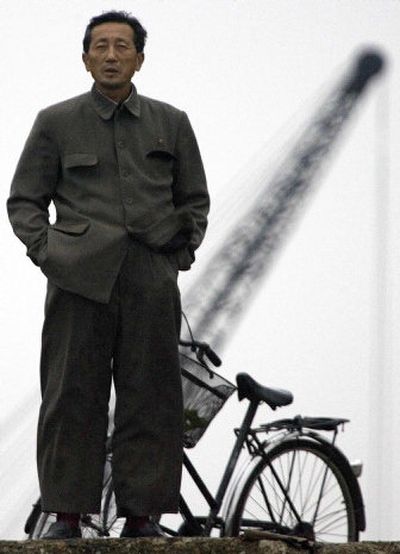N. Korea can take penalties, analysts say

SEOUL, South Korea – At a kindergarten in Hyangsan, a small city near North Korea’s capital, dozens of colorfully dressed children put on a calisthenics display this month for visitors from the U.N. World Food Program.
The children, full of corn porridge and high-protein biscuits provided daily by the aid agency, jumped, stretched briskly and looked healthy, said Jean-Pierre DeMargerie, the top program official in North Korea.
“It’s always difficult to get a clear picture,” he said. “The North Koreans don’t like to expose those that might be sick or weak. You build your assumptions on a relatively small sample.”
North Korea, one of the world’s most isolated nations, is a hard society to fathom even for the few foreigners who visit regularly. Whether it is on the verge of economic collapse or resilient in the face of decades of adversity and deprivation remains a matter of conjecture.
The shroud that keeps North Korea hidden makes it virtually impossible to judge whether the limited sanctions the United Nations imposed in retaliation for an apparent nuclear weapons test Oct. 9 will have any effect on the regime of Kim Jong Il.
The Bush administration hopes the sanctions and international rebuke, particularly from China, North Korea’s main source of trade and investment, will prompt Kim to halt his nuclear program and resume negotiations on a diplomatic solution. “I think (the North Koreans) were surprised by a 15-0” vote on sanctions by the U.N. Security Council, Secretary of State Condoleezza Rice said Saturday. “We’ll see whether or not they are prepared.”
DeMargerie and a half-dozen others who visited North Korea recently say it is better off than a few years ago and may be able to withstand sanctions.
The sanctions could reduce the amount of hard currency North Korea receives, but market reforms in place since 2002 and stockpiling of excess cash, food aid and fuel may give Kim a cushion to defy the U.N.
In 2005, North Korea “received a surplus of a half-million to 600,000 tons of grain” from China and South Korea, said Kenneth Quinones, a former U.S. intelligence expert on North Korea who teaches at Akita International University in Japan. “It looks like most of that went into storage.” North Korea also had a decent harvest this year after two consecutive bumper crops, he said.
Pyongyang, a gloomy capital of bland concrete high-rises and little commerce a decade ago, has a few dozen shops and many sidewalk stalls selling ice cream, cookies, flowers, even videocassettes, said Simon Cockerell, manager for Beijing-based Koryo Tours, which organizes trips to North Korea.
Cockerell said there are four or five billboards for cars, the first commercial advertising in the country. Electricity blackouts, once common, are rare in the capital, he said.
On the negative side, trade with China, which totaled more than $1.5 billion last year, is down about 30 percent this year because of the difficulty of transferring funds to North Korean bank accounts, said Nam Sung Wook, head of North Korean Studies at Korea University in Seoul. The problem stems from U.S. action last year to freeze North Korean accounts in a bank in the Chinese enclave of Macau linked to counterfeiting and money laundering.
He forecasts negative growth for the North Korean economy this year after 2.2 percent growth last year. Even so, new sanctions “will not collapse the North Korean economy,” he said.
Rice conceded that sanctions are no certain solution. “I think we’ll be at this for a while,” she said. “I can’t tell you how long.”